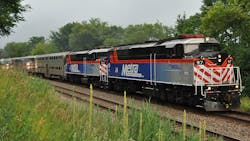Metra introduced a proposed 2021 operating budget of $700 million that does not call for any fare increases or service cuts from present levels, but will require expenses to be cut by $70 million unless the agency receives additional COVID-19-realted financial assistance.
Metra also detailed a 2021 capital budget of $386.4 million that continues significant investment in railcars, locomotives, bridges and stations.
The full budget document can be viewed on Metra’s website.
The proposed operating spending plan assumes that Metra ridership will end 2020 at about 20 percent of the pre-COVID-19 level and increase to 50 percent by the end of 2021. If that happens, Metra expects about $158 million in fare revenue. With an additional $336 million expected from regional transportation sales taxes and $206 million from the federal CARES Act, it will have $700 million available to spend in 2021.
However, at current spending rates and service levels and with projected 2021 increases – mostly due to inflation and contractual obligations – Metra will need $770 million in revenue next year. With a fare increase ruled out, it must either secure $70 million in revenue from other sources – most likely another federal relief bill – further trim its expenses by $70 million or identify new revenue and cuts totaling $70 million.
The situation will be similar in 2022 and 2023. Over the 2021-2023 plan period, the gap between what Metra can afford to spend and what it would cost to operate normal service is $570 million. If Metra does not receive additional federal assistance, drastic actions impacting service will be required in 2021 and beyond, says the agency.
“Without more financial assistance, we face some awful and extremely difficult choices, including cuts in service,” said Metra CEO/Executive Director Jim Derwinski. “With our sister agencies in Chicago and across the country in the same predicament, we need to get the message out that public transportation will be severely curtailed without additional financial relief.”
Metra is proposing one change in fares: an adjustment to the weekend pass in order to entice more families and discretionary travelers to ride the system. Starting Feb. 1, a new Saturday or Sunday Day Pass will be available for $7 and valid only on either Saturday or Sunday. The existing $10 two-day Weekend Pass would be retained, but only on the Ventra app. The validity period for both passes will be 14 days, a change from the current 90-day validity period for the existing weekend pass.
Metra also introduced a 2021 capital budget of $386.4 million, the second year of significant increase in capital funding from Springfield’s 2019 passage of a new capital program. More than half of the capital funding will go towards major projects, including:
- $69.9 million for locomotive and car rehabilitation. Metra will continue its innovative and cost-efficient locomotive and car rehab programs and will fund programs to overhaul 21 recently purchased Amtrak locomotives and upgrade locomotives with more reliable AC traction motors.
- $61.5 million for new rolling stock. Metra is close to purchasing new railcars after asking manufacturers to propose new designs that maximize capacity and add customer amenities.
- $12.9 million for bridges. Metra has nearly 500 bridges that are more than a century old. Funding will be used to design and construct the replacement of several bridges.
- $47.3 million for stations. Metra is undertaking a major effort to upgrade its stations, with an emphasis on improving ADA accessibility and ensuring that every station has a warming shelter.
- $34.9 million for equipment and vehicles.
A public hearing for Metra’s Preliminary 2021 Operating and Capital Program and Budget, the 2021-2023 Financial Plan, and the 2021-2025 Capital Program will be conducted virtually on Thursday, Nov. 5, 2020 from 4:00 p.m. to 7:00 p.m. The hearing will be available to the public within Cook, DuPage, Kane, Lake, McHenry and Will counties through Webex.


